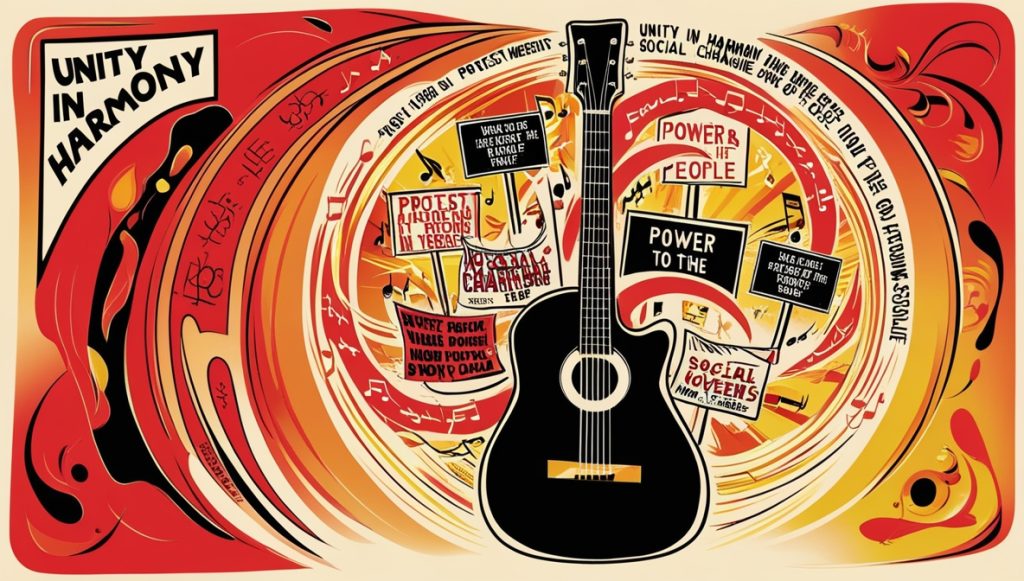Music has long been a powerful force in social movements, serving as both a reflection of societal struggles and a tool for rallying people toward change. Throughout history, songs have inspired, united, and empowered individuals fighting for justice, equality, and human rights. Whether through folk ballads, spirituals, or protest anthems, music has been central to movements that seek to challenge the status quo and advocate for social progress.
Music as a Voice for the Oppressed
One of the most significant ways in which music intersects with social movements is by giving voice to the oppressed. It allows marginalized groups to express their frustrations, hopes, and demands for change in a way that is accessible and relatable. For example, during the American Civil Rights Movement of the 1950s and 1960s, songs like “We Shall Overcome” became anthems of resistance and solidarity. These songs, often rooted in African American spirituals and gospel music, provided a sense of unity and strength among activists fighting against racial segregation and injustice.
Similarly, the labor movements of the early 20th century in the United States used folk songs to articulate the struggles of workers demanding better conditions. Artists like Woody Guthrie, with his iconic song “This Land Is Your Land,” gave a voice to the working class, capturing the essence of their fight for fair treatment and labor rights. These songs became rallying cries that galvanized workers and supported the growth of the labor movement.
The Role of Music in Political Resistance
Music has often been used as a form of political resistance, critiquing systems of power and oppression. During the anti-apartheid movement in South Africa, musicians such as Miriam Makeba and Hugh Masekela used their platform to bring international attention to the brutal system of racial segregation. Their music, infused with traditional African rhythms and protest lyrics, helped raise global awareness of the injustice faced by Black South Africans. Songs like Makeba’s “Soweto Blues” and Masekela’s “Bring Him Back Home” (calling for the release of Nelson Mandela) became symbols of the fight against apartheid.
In Latin America, during the 1960s and 1970s, the Nueva Canción (New Song) movement emerged, blending folk music with revolutionary political messages. Artists like Chile’s Victor Jara used their music to advocate for social justice and to resist oppressive regimes. Jara’s music, which often spoke of the struggles of the poor and the need for political reform, became a tool for mobilizing the masses, particularly during the Pinochet dictatorship in Chile.
Music as a Unifying Force
One of the most powerful aspects of music is its ability to unify people across divides. Songs can transcend language and cultural barriers, creating a shared experience that fosters solidarity. During the anti-Vietnam War movement in the United States, songs like Bob Dylan’s “Blowin’ in the Wind” and Marvin Gaye’s “What’s Going On” became anthems for peace and protest. These songs resonated with millions of people worldwide, helping to galvanize a generation of activists and sparking discussions on the morality of war, civil rights, and social justice.
The feminist movement of the 1970s also found its voice through music. Artists like Aretha Franklin with “Respect” and Helen Reddy with “I Am Woman” empowered women and gave them songs that reflected their struggle for equality. These anthems helped to rally support for gender equality, and they remain iconic feminist symbols today.
Contemporary Movements and Music
In recent years, music continues to play a vital role in social movements. The Black Lives Matter movement has drawn on the legacy of civil rights-era music, with contemporary artists like Kendrick Lamar, Beyoncé, and Childish Gambino creating songs that address issues of systemic racism and police brutality. Lamar’s song “Alright” became an unofficial anthem of the movement, while Gambino’s “This Is America” sparked discussions about race, violence, and inequality in the U.S.
Music, as a universal form of expression, remains a crucial tool for social movements, helping to amplify voices, challenge injustice, and inspire change. By harnessing the power of melody and rhythm, artists continue to give life to the struggles and aspirations of movements for a more just and equitable world.



